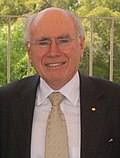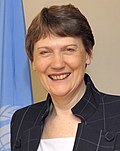The outcomes are summarised in the Chairman's Statement of the 3rd East Asia Summit Singapore, 21 November 2007.
Myanmar
The issue of Myanmar or Burma, following the 2007 Myanmar anti-government protests, was to be on the agenda for the third EAS [1] It was originally suggested that the UN Secretary-General's Special Advisor Dr. Ibrahim Gambari has been invited to brief the leaders at the summit. [2] However, following the ASEAN Summit the preceding day a pressure from Myanmar, ASEAN decided that Dr. Gambari will not brief the leaders but rather Burmese Prime Minister Thein Sein will address the ASEAN Summit and ASEAN would facilitate briefings with other interested parties. [3] Dr. Gambari was available for private briefings of the leaders.
Climate change
The third EAS was expected to make an announcement on tackling climate change. [4] At the Summit the Singapore Declaration on Climate Change, Energy and the Environment [5] was signed establishing aspirational targets on climate change, energy and the environment.
Trade
The Summit agreed to receive at the Fourth EAS the further report on the Comprehensive Economic Partnership in East Asia (CEPEA) proposed at the Second EAS.
The Summit also agreed to the establishment of the Economic Research Institute for ASEAN and East Asia (ERIA).
The Chairman's Statement of the 3rd East Asia Summit Singapore, 21 November 2007 said:
13. We agreed to the establishment of the Economic Research Institute of ASEAN and East Asia (ERIA) to be accommodated temporarily at the ASEAN Secretariat. We welcomed the report submitted to us by the Expert Group, which focuses on research topics of strategic interest to the EAS countries. We encouraged the Expert Group to continue its research work and we looked forward to practical policy recommendations to further regional integration and strengthen partnerships in East Asia.
14. We welcomed the progress report of the study by scholars and academics on a Comprehensive Economic Partnership in East Asia (CEPEA), and encouraged them to maintain good momentum in their work towards submitting a final report of recommendations through the Economic Ministers to us at the 4th East Asia Summit. It would be useful to incorporate the views of the private sector in the work process. The CEPEA should build upon and add value to our existing FTAs. We encouraged the expeditious conclusion of our ASEAN Plus 1 FTAs.
This page is based on this
Wikipedia article Text is available under the
CC BY-SA 4.0 license; additional terms may apply.
Images, videos and audio are available under their respective licenses.
















